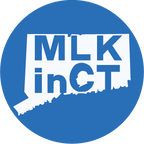- Home
- About Dr. King
- The Memorial
- Documentary
- Donate
- Find Us Online
- MLK in CT Sponsors
- Gallery
-
Press
- Assignment America
- NPR
- Associated Press
- NBC Connecticut >
- Hartford Courant >
- Simsbury News >
- Simsbury Patch >
- Simsbury LIFE
- Journal Inquirer
- Connecticut Today
- Connecticut Network
- Connecticut Magazine
- Farmington Valley Times
- Fairfield & Westchester County Business Journals
- WNPR >
- NewsBreak
- WTNH >
- CT Insider
- Stamford Advocate
- CT Magazine
- WFSB
- MTIC-AM At Home CT
The Hartford Courant
January 17, 2014
Nicholas Rondinone
January 17, 2014
Nicholas Rondinone
Simsbury Group to Build Memorial Recognizing King's Time in Town, State
SIMSBURY — Groups of young adults from the South toiled in the hot, humid Connecticut summers in the 1940s picking tobacco, a staple crop of the area. Among them was Martin Luther King Jr.
King spent two summers picking tobacco at the Cullman Brothers farm in Simsbury.
A group of Simsbury High School students and community members are now trying to permanently commemorate King's time in town.
The students, who all draw inspiration from King's messages, said this project dives deeper than picking tobacco.
"It's the fact that he was so changed by what he experienced… that's what the memorial is really supposed to encompass," said Margaret House, a freshman at Brown University who has been involved in the project since she was in high school.
The students, along with some who came before them and members of the community, are fundraising to build a memorial to King near to the Simsbury Historical Society. It will be composed of five glass panels that will commemorate various parts of King's life, according to the group.
"A lot of people in Connecticut feel disconnected from the Civil Rights movement," said Grace Angus, a senior at Simsbury High School who is part of the MLK In CT memorial committee. "To say that it was close to home … is a really important piece of our project."
The group is moving along with fundraising. Currently, they have about $60,000 raised of the $100,000 needed, according to Joan Rogers, a resident who advises the group.
"It's a truly collaborative community project," Rogers said. Part of the fundraising efforts includes selling bricks that will be part of the memorial – about 60 of which have sold for $100 each.
Simsbury High School Junior Eric Lepowsky said: "It's really interesting that such a prominent public figure was actually in our town. It's a unique opportunity for us to explore."
Before starting work on the memorial, Simsbury High School students, some of whom are still connected with the project today, made a documentary about King's time in town.
King's first trip to the state was in the summer of 1944 with a group of students at Morehouse College in Atlanta. He came again in 1947. It was on these trips that King left the then segregated South.
Throughout the time he spent in Simsbury, he wrote several letters to family. In one to his mother from 1944, King wrote: "We went to church Sunday in Simsbury and we were the only Negroes there. Negroes and whites go to the same church."
When not working one day, he visited Hartford, and wrote to his mother: "We really had a nice time there. I never thought that a person of my race could eat anywhere, but we ate in one of the finest restaurants in Hartford."
He wrote in his autobiography: "After that summer in Connecticut, it was a bitter feeling going back to segregation."
This time in town left a lasting impact on King.
"I could never adjust to the separate waiting rooms, separate eating places, separate rest rooms, partly because the separate was always unequal, and partly because the very idea of separation did something to my sense of dignity and self-respect," he wrote in his autobiography.
Each student agreed that people in the state may not know much more than King had spent summers in Connecticut picking tobacco.
"It's where he decided to become a minister and first experienced integration," House said.
And it's that information the group hopes to educate people both through the documentary and the memorial.
Members of the committee do presentations about King to school children and other groups in the area and hope to continue that when the memorial is built.
The committee said they hope to break ground on the memorial in late spring or early summer and could have education programs and students and others visit the site in fall or next spring.
Rogers said she has heard from the state and other organizations that would be interested in funding educational programs at the memorial once it is built.
Along with the memorial, a separate committee has been planning an annual program honoring at First Church of Christ – the same church he once worshipped in during his visit to Simsbury.
The program, which is open to the public, begins at 2 p.m. Monday and Rogers said it is traditionally very well attended.
Those interested in donating can visit MLKinCT.com for more information.
- Home
- About Dr. King
- The Memorial
- Documentary
- Donate
- Find Us Online
- MLK in CT Sponsors
- Gallery
-
Press
- Assignment America
- NPR
- Associated Press
- NBC Connecticut >
- Hartford Courant >
- Simsbury News >
- Simsbury Patch >
- Simsbury LIFE
- Journal Inquirer
- Connecticut Today
- Connecticut Network
- Connecticut Magazine
- Farmington Valley Times
- Fairfield & Westchester County Business Journals
- WNPR >
- NewsBreak
- WTNH >
- CT Insider
- Stamford Advocate
- CT Magazine
- WFSB
- MTIC-AM At Home CT

